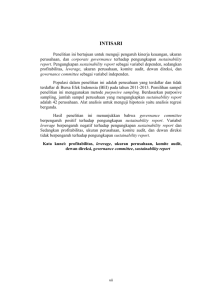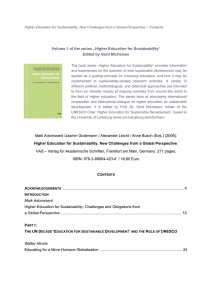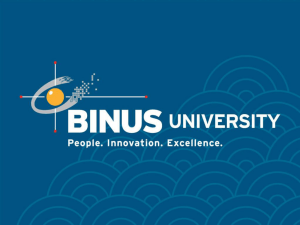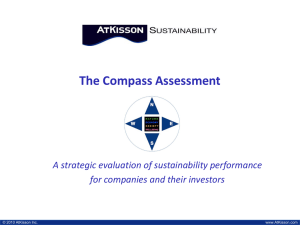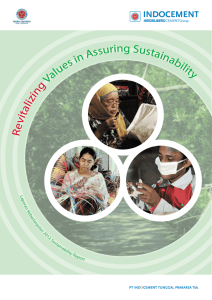CALL for PAPER - Franco Angeli Editore
advertisement
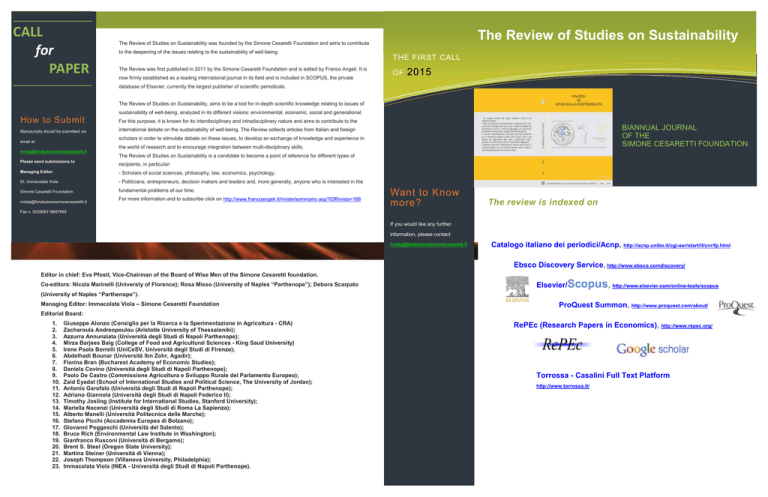
_____________________ CALL for PAPER _____________________ The Review of Studies on Sustainability The Review of Studies on Sustainability was founded by the Simone Cesaretti Foundation and aims to contribute to the deepening of the issues relating to the sustainability of well-being. The Review was first published in 2011 by the Simone Cesaretti Foundation and is edited by Franco Angeli. It is now firmly established as a leading international journal in its field and is included in SCOPUS, the private THE FIRST CALL OF 2015 database of Elsevier, currently the largest publisher of scientific periodicals. The Review of Studies on Sustainability, aims to be a tool for in-depth scientific knowledge relating to issues of sustainability of well-being, analyzed in its different visions: environmental, economic, social and generational. How to Submit For this purpose, it is known for its interdisciplinary and intradisciplinary nature and aims to contribute to the Manuscripts should be submitted via international debate on the sustainability of well-being. The Review collects articles from Italian and foreign BIANNUAL JOURNAL OF THE SIMONE CESARETTI FOUNDATION scholars in order to stimulate debate on these issues, to develop an exchange of knowledge and experience in email at: the world of research and to encourage integration between multi-disciplinary skills. rivista@fondazionesimonecesaretti.it Please send submissions to The Review of Studies on Sustainability is a candidate to become a point of reference for different types of recipients, in particular: Managing Editor: - Scholars of social sciences, philosophy, law, economics, psychology; Dr. Immacolata Viola - Politicians, entrepreneurs, decision makers and leaders and, more generally, anyone who is interested in the Simone Cesaretti Foundation fundamental problems of our time. rivista@fondazionesimonecesaretti.it For more information and to subscribe click on http://www.francoangeli.it/riviste/sommario.asp?IDRivista=168 Want to Know more? The review is indexed on Fax n. 003908119657692 If you would like any further information, please contact: rivista@fondazionesimonecesaretti.it Catalogo italiano dei periodici/Acnp, http://acnp.unibo.it/cgi-ser/start/it/cnr/fp.html Ebsco Discovery Service, http://www.ebsco.comdiscovery/ Editor in chief: Eva Pfostl, Vice-Chairman of the Board of Wise Men of the Simone Cesaretti foundation. Co-editors: Nicola Marinelli (Universty of Florence); Rosa Misso (University of Naples “Parthenope”); Debora Scarpato Elsevier/Scopus, http://www.elsevier.com/online-tools/scopus (University of Naples “Parthenope”). Managing Editor: Immacolata Viola – Simone Cesaretti Foundation ProQuest Summon, http://www.proquest.com/about/ Editorial Board: 1. 2. 3. 4. 5. 6. 7. 8. 9. 10. 11. 12. 13. 14. 15. 16. 17. 18. 19. 20. 21. 22. 23. Giuseppe Alonzo (Consiglio per la Ricerca e la Sperimentazione in Agricoltura - CRA) Zacharoula Andreopoulou (Aristotle University of Thessaloniki); Azzurra Annunziata (Università degli Studi di Napoli Parthenope); Mirza Barjees Baig (College of Food and Agricultural Sciences - King Saud University) Irene Paola Borrelli (UniCeSV, Università degli Studi di Firenze); Abdelhadi Bounar (Università Ibn Zohr, Agadir); Florina Bran (Bucharest Academy of Economic Studies); Daniela Covino (Università degli Studi di Napoli Parthenope); Paolo De Castro (Commissione Agricoltura e Sviluppo Rurale del Parlamento Europeo); Zaid Eyadat (School of International Studies and Political Science, The University of Jordan); Antonio Garofalo (Università degli Studi di Napoli Parthenope); Adriano Giannola (Università degli Studi di Napoli Federico II); Timothy Josling (Institute for International Studies, Stanford University); Mariella Nocenzi (Università degli Studi di Roma La Sapienza); Alberto Manelli (Università Politecnica delle Marche); Stefano Picchi (Accademia Europea di Bolzano); Giovanni Poggeschi (Università del Salento); Bruce Rich (Environmental Law Institute in Washington); Gianfranco Rusconi (Università di Bergamo); Brent S. Steel (Oregon State University); Martina Steiner (Università di Vienna); Joseph Thompson (Villanova University, Philadelphia); Immacolata Viola (INEA - Università degli Studi di Napoli Parthenope). RePEc (Research Papers in Economics), http://www.repec.org/ Torrossa - Casalini Full Text Platform http://www.torrossa.it/ INTRODUCTION FOCUS “Food for If today we were to define with one word the historical period we are living, “insecurity” sustainability Conditions of Sustainability & Food Systems would, in our opinion, be the most appropriate term. The process of globalization, along with undoubted merits, has triggered, in society, the ongoing processes of and not just food” “adjustment”, to which not all individuals, local systems, nations were able to respond positively. This, in particular, due to the globalization of markets which was not accompanied by the globalization of rights and rules. At a global and local level, this has thus created imbalances in development performance and inequalities in level of well-being among social classes and age groups. In this scenario, the principle of equity, from universal value, for many years the We are pleased to center of the concerns of economists, sociologists, politicians, has become announce and call increasingly unlikely to be achieved. More specifically, in a global society, where the for papers for the “Trade Vision” of well-being has prevailed over all others, too often we have focused on following The five conditions of sustainability are a vital cornerstone on which to build a “Sustainability Empowerment” strategy; more precisely, they are found in: competitive strategies of conjunctural character, played on every possible form of 1) the need for a harmonious balance between the four visions of well- dumping.Within being (trade, social, eco-centric, generational); this logic environmental reservoirs and human capital have forthcoming issues experienced increased stress. From here, the creeping and increasing marginalization 2) the replicability of the four stock of capital: environmental (natural, of the Revue of of the principle of inter-generational and intra-generational equity. Compared to the landscape and cultural deposits), economic, human and social capital Studies on latter, especially young people have paid and continue to pay the highest price of stock; Sustainability – “insecurity”. 3) the interconnection between the drivers of development of the society: Rivista di Studi sulla A “very high” price in terms of loss of faith in this society, a keen sense of non belonging, lack of confidence in the possibility to participate and design, the loss of knowledge, active and inclusive participation of all stakeholders of the “high” reference values. overarching theme If, as is claimed by many, young people are the cornerstone of a global society that on “Food for wants to project itself into the future, it is necessary to admit that the “Youth System” sustainability and and, with it, the “Global Society” are at risk. able to do this social component the red wire towards a sustainable This, due to two fundamental reasons: horizon; -Young people are no longer able to project themselves into the future because there is 5) respect of rights and global rules. (milieu) able to provide the tissue of interconnection of each local system; 4) the Youth's Society, that is, real and concrete projects for young people, Deadline for the submission of original papers: February 28th, 2015 th Deadline for the submission of abstract (800 characters) and title: December 30 , 2014 sustainable horizon in which to project themselves. It is thus necessary to redefine, as a first step, a “New Project of Society”, based on Terms and Conditions values and principles, inclusive, but above all be able to offer an “Integrated Vision” of the concept of well-being and sustainability. We encourage researchers from economics, agriculture, philosophy, law, sociology, political science, education, and other domains to make their latest work available to the community via this issue. We welcome conceptual and empirical papers aimed at providing comprehensive solutions to the integrated combination of technical – scientific solutions, rules, and a new culture of individual and collective concept of "Food for Sustainability" that would enable to address this great challenge, even relocating the agro-food systems of the planet in a strategic centrality. GLOBAL AND LOCAL GOVERNANCE RESPECT FOR HUMAN RIGHTS NEO-GENERATIONAL PLANNING a lack of conditions for their active participation in society. -They suffer the absence of a “Project of Society” which allows them to have a The Review of Studies on Sustainability, therefore gathers scientific contributions can highlight the links between the conditions of sustainability and food systems and that, in relation to the latter deepen the following topics: society, the universal values (ethics, equity, efficiency), an environment Sostenibilita’ on the not just food” In this context, the food systems are required to align themselves to the five conditions to be able to contribute in a tangible way to the creation of a “Sustainability Empowerment” strategy. Publication charges for 2015 are listed below: - € 300,00 for paper The Review of Studies on Sustainability, - n. of page: min 10 – max 15. The Review will not promoted by the Simone Cesaretti accept paper with a number of pages less than 10 Foundation, is now firmly established as a pages or more than 15 pages. leading international journal in its field and is - They should conform strictly to the publisher’s included in SCOPUS. formatting and other requirements described in the journal’s author guidelines at: http://www.francoangeli.it/riviste/sommario.asp?ID TERRITORIAL IDENTITY MILIEU KNOWLEDGE & INNOVATION MANAGEMENT HUMAN CAPITAL ENVIRONMENTAL CAPITAL SOCIAL CAPITAL Rivista=168. The Review will not accept unformatted paper ECONOMIC CAPITAL
